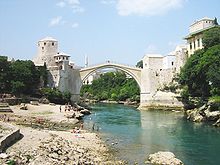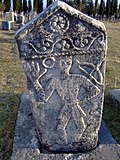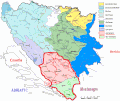Stari Most
Stari Most | |
|---|---|
 Stari Most in 2007 | |
| Coordinates | 43°20′14″N 17°48′54″E / 43.33728°N 17.81503°E |
| Carried | Pedestrians |
| Crossed | Neretva |
| Locale | Mostar, Bosnia and Herzegovina |
| Official name | Stari most |
| Heritage status | |
| Official name | Old Bridge Area of the Old City of Mostar |
| Type | Cultural |
| Criteria | vi |
| Designated | 2005 (29th session) |
| Reference no. | 946 |
| Region | Europe |
| Official name | Old Bridge (Stari Most) in Mostar |
| Type | Category 0 cultural property |
| Criteria | A, B, C ii.iii.iv., D ii.iv., E i.ii.iii.iv.v., F i.ii.iii., G i.v.vi.vii., H ii., I i.ii.iii. |
| Designated | 8 July 2004 (session No. 07.1-02-903/03-29) |
| Part of | Mostar, the historic urban site |
| Reference no. | 2493 |
| List of National Monuments of Bosnia and Herzegovina | |
| Characteristics | |
| Design | Arch |
| Material | Stone |
| Total length | 29 metres (95 ft) |
| Width | 4 metres (13 ft) |
| No. of spans | 1 |
| Clearance below | c. 100 metres (330 ft) at mid-span depending on river water-level |
| History | |
| Architect | Mimar Hayruddin (concept could originate from Mimar Sinan's idea) |
| Constructed by | Mimar Hayruddin, apprentice of Mimar Sinan |
| Construction start | 1557 |
| Construction end | 1566 |
| Opened | 1566 |
| Rebuilt | 7 June 2001 – 23 July 2004 |
| Destroyed | 9 November 1993 |
| Location | |
 | |
Stari Most (lit. 'Old Bridge'), also known as Mostar Bridge, is a rebuilt 16th-century Ottoman bridge in the city of Mostar in Bosnia and Herzegovina. It crosses the river Neretva and connects the two parts of the city, which is named after the bridge keepers (mostari) who guarded the Stari Most during the Ottoman era.[1] During the Croat–Bosniak War, the Army of the Republic of Bosnia and Herzegovina used the bridge as a military supply line, and the bridge was shelled by the Croatian Defence Council (HVO) and collapsed on 9 November 1993. Subsequently, the bridge was reconstructed, and it re-opened on 23 July 2004.
The Old Bridge is an exemplary piece of Balkan Islamic architecture. It was commissioned by Suleiman the Magnificent in 1557 and designed by Mimar Hayruddin, a student and apprentice of the architect Mimar Sinan.
Characteristics
[edit]The bridge spans the Neretva River in the old town of Mostar, the unofficial capital of Herzegovina. The Stari Most is hump-backed, 4 metres (13 ft 1 in) wide and 30 metres (98 ft 5 in) long, and dominates the river from a height of 24 m (78 ft 9 in). Two fortified towers protect it: the Halebija tower on the northeast and the Tara tower on the southwest, called "the bridge keepers" (natively mostari).[2]
Instead of foundations, the bridge has abutments of limestone linked to wing walls along the waterside cliffs. Measuring from the summer water level of 40.05 m (131 ft 5 in), abutments are erected to a height of 6.53 metres (21 ft 5 in), from which the arch springs to its high point. The start of the arch is emphasized by a molding 0.32 metres (1 ft 1 in) in height. The rise of the arch is 12.02 metres (39 ft 5 in).[2]
History
[edit]
The stone single-arch bridge is considered an exemplary piece of Balkan Islamic architecture and was commissioned by Suleiman the Magnificent in 1557. It was designed by Mimar Hayruddin, a student and apprentice of architect Mimar Sinan who built many of the Sultan's key buildings in Istanbul and around the empire.[3][4][5][6]
As Mostar's economic and administrative importance grew with the growing presence of Ottoman rule, the precarious wooden suspension bridge over the Neretva gorge required replacement. The old bridge on the river "...was made of wood and hung on chains," wrote the Ottoman geographer Katip Çelebi, and it "...swayed so much that people crossing it did so in mortal fear".[citation needed] In 1566, Mimar Hayruddin designed the replacement bridge, which was said to have cost 300,000 Drams (silver coins) to build. The two-year construction project was supervised by Karagoz Mehmet Bey, Sultan Suleiman's son-in-law and the patron of Mostar's most important mosque complex, the Hadzi Mehmed Karadzozbeg Mosque.[citation needed]
Construction began in 1557 and took nine years: according to the inscription the bridge was completed in 974 AH, corresponding to the period between 19 July 1566 [1] and 7 July 1567. Little is known of the construction of the bridge, thought to have been made from mortar made with egg whites,[7] and all that has been preserved in writing are memories and legends and the name of the builder, Mimar Hayruddin. Charged under pain of death to construct a bridge of such unprecedented dimensions, Hayruddin reportedly prepared for his own funeral on the day the scaffolding was finally removed from the completed structure. Upon its completion it was the widest human-made arch in the world. [citation needed]
The 17th Century Ottoman explorer Evliya Çelebi wrote that the bridge "is like a rainbow arch soaring up to the skies, extending from one cliff to the other... I, a poor and miserable slave of Allah, have passed through 16 countries, but I have never seen such a high bridge. It is thrown from rock to rock as high as the sky."[8]
Destruction
[edit]During the Croat–Bosniak War, the Bosniak Army of the Republic of Bosnia and Herzegovina used the Old Bridge as a military supply line.[9][10] Slobodan Praljak, the commander of the Croat Defence Council ordered the destruction of the bridge which collapsed on 9 November 1993 as a result of shelling by the Bosnian Croat forces. The International Criminal Tribunal for the former Yugoslavia found it to be a legitimate military target as the opposing Army of the Republic of Bosnia and Herzegovina used it for military purposes.[9][10][11]
The first temporary bridge on the traces of the Old Bridge was open on 30 December 1993; built in only three days by Spanish military engineers assigned to the United Nations Protection Force (UNPROFOR) mission.[12][13][14] The temporary structure was subsequently upgraded three times, to eventually link the shores with a more secure cable-stayed bridge until the proper reconstruction of the Old Bridge.[15][14]
Newspapers based in Sarajevo reported that more than 60 shells hit the bridge before it collapsed.[16] Praljak published a document, "How the Old Bridge Was Destroyed", where he argues that there was an explosive charge or mine placed at the centre of the bridge underneath and detonated remotely, in addition to the shelling, which caused the collapse. Most historians dismiss these claims and disagree with their conclusions.[17]
Reconstruction
[edit]After the end of the war, plans were raised to reconstruct the bridge. The World Bank, the United Nations Educational, Scientific and Cultural Organization (UNESCO), the Aga Khan Trust for Culture and the World Monuments Fund formed a coalition to oversee the reconstruction of the Stari Most and the historic city centre of Mostar.[18] Additional funding was provided by Italy, the Netherlands, Turkey, Croatia and the Council of Europe Development Bank, as well as the Government of BiH.[18] In October 1998, UNESCO established an international committee of experts to oversee the design and reconstruction work.[18] It was decided to build a bridge as similar as possible to the original, using the same technology and materials.[18]
The bridge was re-built in two phases: the first one being led by Hungarian army engineers, consisting of the lifting of submerged material for its repurpose; and the second one being the removal of the temporary bridge, a task assigned to Spanish army engineers, and the reconstruction of the Old Bridge with Ottoman construction techniques by a partnership of civil engineering companies led by the Turkish Er-Bu.[19][20][21] Tenelia, a fine-grained limestone, sourced from local quarries was used and Hungarian army divers recovered stones from the original bridge from the river below, although most were too damaged to reuse.[18][22][19]
Reconstruction commenced on 7 June 2001. The reconstructed bridge was inaugurated on 23 July 2004, with the cost estimated to be 15.5 million US dollars.[18][2][12]
Diving
[edit]
Stari Most diving is a traditional annual competition in diving organized every year in mid summer (end of July). It is traditional for the young men of the town to leap from the bridge into the Neretva. As the Neretva is very cold, this is a risky feat and requires skill and training,[23] though according to TripAdvisor, tourists do dive as well.[24] In 1968 a formal diving competition was inaugurated and held every summer. The first person to jump from the bridge since it was re-opened was Enej Kelecija.[25]
Since 2015, Stari Most has been a tour stop in the Red Bull Cliff Diving World Series.[26] In 2019 the diving was featured on Series 2, episode 3 of The Misadventures of Romesh Ranganathan.[27]
In popular culture
[edit]- Turkish rock band Bulutsuzluk Özlemi's 1996 song "Yaşamaya Mecbursun" (lit. 'You have to live') is about the destruction of Stari Most.[28]
- Old Bridge, a play by Papatango New Writing Prize winner Igor Memic, explores personal and historical narratives tied to the significance of the Old Bridge in Mostar. It premiered in 2021 at the Bush Theatre in London and received the Outstanding Achievement in an Affiliate Theatre award at the 2022 Olivier Awards.[29][30][31]
See also
[edit]- List of bridges in Bosnia and Herzegovina
- List of World Heritage Sites in Bosnia and Herzegovina
- List of National Monuments of Bosnia and Herzegovina
- Tourism in Bosnia and Herzegovina
- Museum of the Old Bridge
- History of Bosnia and Herzegovina
References
[edit]- ^ Centre, UNESCO World Heritage (11 October 2017). "Old Bridge Area of the Old City of Mostar". UNESCO World Heritage Centre (in Latin). Archived from the original on 20 June 2021. Retrieved 17 June 2021.
- ^ a b c "Old Bridge (Stari Most) in Mostar – Commission to preserve national monuments". old.kons.gov.ba. Commission to preserve national monuments (KONS). 8 July 2004. Archived from the original on 26 June 2018. Retrieved 25 June 2018.
- ^ Balić, Smail (1973). Kultura Bošnjaka: Muslimanska Komponenta. Vienna. pp. 32–34. ISBN 9783412087920.
{{cite book}}: CS1 maint: location missing publisher (link) - ^ Čišić, Husein (2007). Razvitak i postanak grada Mostara. Štamparija Mostar. p. 22. ISBN 9789958910500.
- ^ Stratton, Arthur (1972). Sinan. New York: Charles Scribner's Sons. ISBN 9780684125824.
- ^ Jezernik, Božidar (1995). "Qudret Kemeri: A Bridge between Barbarity and Civilization". The Slavonic and East European Review. 73 (95): 470–484. JSTOR 4211861.
- ^ "Croats destroy historic bridge". The Independent. London, UK. Archived from the original on 24 May 2022. Retrieved 18 July 2015.
- ^ "Saudi Aramco World: Hearts and Stones". saudiaramcoworld.com. Archived from the original on 4 October 2012. Retrieved 27 October 2014.
- ^ a b Hazan, Pierre (11 December 2017). "Was the destruction of Old Mostar bridge a war crime?". Justiceinfo.net. Lausanne. Retrieved 10 November 2022.
- ^ a b Polšak Palatinuš, Vlatka (29 November 2017). "Presuda šestorci podgrijala vruće pitanje: Kako i zašto je srušen Stari most?". Tportal. Zagreb. Retrieved 10 November 2022.
- ^ "Na današnji dan prije 29 godina srušen Stari most u Mostaru". BHRT. Sarajevo. 9 November 2022. Retrieved 10 November 2022.
- ^ a b Tecco, Simon (24 July 2004). "El Viejo Puente de Móstar vuelve a unir orillas y sentimientos". ABC (in Spanish). Retrieved 22 November 2020.
- ^ Molina, Jorge (4 November 2012). "Un puente para la paz" (mp4) (Documentary) (in Spanish). 31:41. Archived from the original on 21 December 2021 – via YouTube.
- ^ a b UNESCO (January 2005). "Nomination Dossier "The Old City of Mostar"" (PDF). whc.unesco.org. p. 30.
- ^ Ravn, Bente (28 May 1997). "Bridge over troubled waters". SFOR Informer Online. NATO. Retrieved 22 November 2020.
- ^ Coward, Martin (2009). Urbicide: The Politics of Urban Destruction. London: Routledge. pp. 1–7. ISBN 978-0-415-46131-3.
- ^ "Slobodan Praljak: Defending Himself by Distorting History :: Balkan Insight". www.balkaninsight.com. 4 December 2017. Retrieved 7 December 2017.
- ^ a b c d e f Armaly, Maha; Blasi, Carlo; Hannah, Lawrence (2004). "Stari Most: rebuilding more than a historic bridge in Mostar". Museum International. 56 (4): 6–17. doi:10.1111/j.1468-0033.2004.00044.x. S2CID 161607816.
- ^ a b Taylor, David; Hannoun, Lionel; Molland, Halvor; Lehmann, Cristophe; Guner, Ender (7 May 2003). "The Old Mostar Bridge Project". SFOR Informer. 18, 19, 20, 23, 67. NATO. Archived from the original on 1 March 2021. Retrieved 22 November 2020.
- ^ "Stari Most". Archived from the original on 17 July 2012. Retrieved 17 July 2012.
- ^ Press Office of La Moncloa (18 October 2010). "Spain begins its final withdrawal from Bosnia after an 18-year mission". Government of Spain. Archived from the original on 15 April 2021. Retrieved 22 November 2020.
- ^ Dupré, Judith (2017). Bridges: A History of the World's Most Spectacular Spans (Google Books). New York: Hachette/Black Dog & Leventhal Press. ISBN 978-0-316-47380-4. Retrieved 2 March 2020.
- ^ "Bosnia's Bridge Divers Risk Their Necks for Tips and Thrills". 22 November 2015. Archived from the original on 7 July 2018. Retrieved 6 July 2018.
- ^ "Jumping/Diving Mostar Bridge – Old Bridge (Stari Most), Mostar Traveller Reviews". Archived from the original on 7 July 2018. Retrieved 6 July 2018.
- ^ "Chránený klenot" (in Slovak). Pluska. 15 December 2006. Archived from the original on 25 July 2011. Retrieved 4 May 2009.
- ^ "Mostar – Red Bull Cliff Diving". Red Bull Cliff Diving. Archived from the original on 2 March 2020. Retrieved 2 March 2020.
- ^ "BBC Two – The Misadventures of Romesh Ranganathan – Episode guide". BBC. Archived from the original on 5 June 2021. Retrieved 13 August 2021.
- ^ "Yaşamaya Mecbursun (1996)". www.bulutsuzluk.com (in Turkish). Archived from the original on 30 June 2017. Retrieved 2 November 2014.
- ^ "Igor Memic wins Twelfth Annual Papatango New Writing Prize". Official London Theatre. Retrieved 2 November 2024.
- ^ "Old Bridge". Bush Theatre. Retrieved 2 November 2024.
- ^ "Olivier Awards 2022: the full list of winners". The Guardian. 10 April 2022. Retrieved 2 November 2024.
External links
[edit]- Rehabilitation Design of the Old Bridge of Mostar
- Rehabilitation of Satri Most – casopis-gradjevinar.hr
- Kule Tara i Halebija (XVII vijek) – mostar.ba
- Live webcams from Stari most and the Old town. (mirror)
- Bridges over the Neretva in Bosnia and Herzegovina
- National Monuments of Bosnia and Herzegovina
- World Heritage Sites in Bosnia and Herzegovina
- Ottoman bridges in Bosnia and Herzegovina
- Bridges completed in the 16th century
- Buildings and structures completed in 1566
- Transport infrastructure completed in the 1560s
- Buildings and structures in Mostar
- Demolished bridges
- History of Mostar
- Buildings and structures demolished in 1993
- Rebuilt buildings and structures in Bosnia and Herzegovina
- Bridges completed in 2004
- Stone arch bridges in Bosnia and Herzegovina
- Mimar Hayruddin buildings
- Medieval Bosnia and Herzegovina architecture






